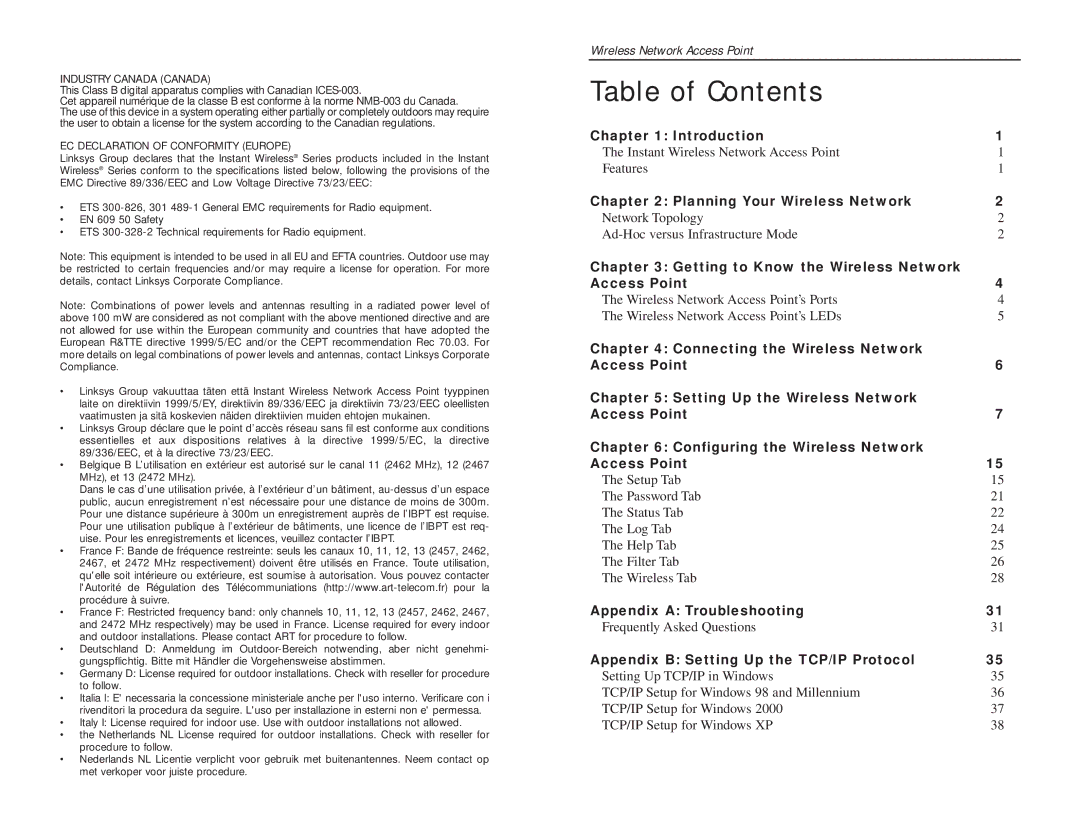INDUSTRY CANADA (CANADA)
This Class B digital apparatus complies with Canadian
Cet appareil numérique de la classe B est conforme à la norme
The use of this device in a system operating either partially or completely outdoors may require the user to obtain a license for the system according to the Canadian regulations.
EC DECLARATION OF CONFORMITY (EUROPE)
Linksys Group declares that the Instant Wireless® Series products included in the Instant Wireless® Series conform to the specifications listed below, following the provisions of the EMC Directive 89/336/EEC and Low Voltage Directive 73/23/EEC:
•ETS
•EN 609 50 Safety
•ETS
Note: This equipment is intended to be used in all EU and EFTA countries. Outdoor use may be restricted to certain frequencies and/or may require a license for operation. For more details, contact Linksys Corporate Compliance.
Note: Combinations of power levels and antennas resulting in a radiated power level of above 100 mW are considered as not compliant with the above mentioned directive and are not allowed for use within the European community and countries that have adopted the European R&TTE directive 1999/5/EC and/or the CEPT recommendation Rec 70.03. For more details on legal combinations of power levels and antennas, contact Linksys Corporate Compliance.
•Linksys Group vakuuttaa täten että Instant Wireless Network Access Point tyyppinen laite on direktiivin 1999/5/EY, direktiivin 89/336/EEC ja direktiivin 73/23/EEC oleellisten vaatimusten ja sitä koskevien näiden direktiivien muiden ehtojen mukainen.
•Linksys Group déclare que le point d’accès réseau sans fil est conforme aux conditions essentielles et aux dispositions relatives à la directive 1999/5/EC, la directive 89/336/EEC, et à la directive 73/23/EEC.
•Belgique B L’utilisation en extérieur est autorisé sur le canal 11 (2462 MHz), 12 (2467 MHz), et 13 (2472 MHz).
Dans le cas d’une utilisation privée, à l’extérieur d’un bâtiment,
•France F: Bande de fréquence restreinte: seuls les canaux 10, 11, 12, 13 (2457, 2462, 2467, et 2472 MHz respectivement) doivent être utilisés en France. Toute utilisation, qu'elle soit intérieure ou extérieure, est soumise à autorisation. Vous pouvez contacter l'Autorité de Régulation des Télécommuniations
•France F: Restricted frequency band: only channels 10, 11, 12, 13 (2457, 2462, 2467, and 2472 MHz respectively) may be used in France. License required for every indoor and outdoor installations. Please contact ART for procedure to follow.
•Deutschland D: Anmeldung im
•Germany D: License required for outdoor installations. Check with reseller for procedure to follow.
•Italia I: E' necessaria la concessione ministeriale anche per l'uso interno. Verificare con i rivenditori la procedura da seguire. L'uso per installazione in esterni non e' permessa.
•Italy I: License required for indoor use. Use with outdoor installations not allowed.
•the Netherlands NL License required for outdoor installations. Check with reseller for procedure to follow.
•Nederlands NL Licentie verplicht voor gebruik met buitenantennes. Neem contact op met verkoper voor juiste procedure.
Wireless Network Access Point
Table of Contents
Chapter 1: Introduction | 1 |
The Instant Wireless Network Access Point | 1 |
Features | 1 |
Chapter 2: Planning Your Wireless Network | 2 |
Network Topology | 2 |
2 | |
Chapter 3: Getting to Know the Wireless Network |
|
Access Point | 4 |
The Wireless Network Access Point’s Ports | 4 |
The Wireless Network Access Point’s LEDs | 5 |
Chapter 4: Connecting the Wireless Network |
|
Access Point | 6 |
Chapter 5: Setting Up the Wireless Network |
|
Access Point | 7 |
Chapter 6: Configuring the Wireless Network |
|
Access Point | 15 |
The Setup Tab | 15 |
The Password Tab | 21 |
The Status Tab | 22 |
The Log Tab | 24 |
The Help Tab | 25 |
The Filter Tab | 26 |
The Wireless Tab | 28 |
Appendix A: Troubleshooting | 31 |
Frequently Asked Questions | 31 |
Appendix B: Setting Up the TCP/IP Protocol | 35 |
Setting Up TCP/IP in Windows | 35 |
TCP/IP Setup for Windows 98 and Millennium | 36 |
TCP/IP Setup for Windows 2000 | 37 |
TCP/IP Setup for Windows XP | 38 |
